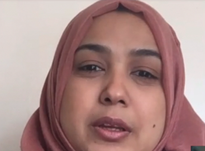Fahmida

Ethnicity: Bangladeshi
Background: Fahmida is 40 years old and is Bangladeshi. She lives with her husband and children and works as a teaching assistant. Brief Outline: Fahmida became very unwell with Covid so her husband rang the emergency services. When she arrived at hospital, she had a variety of tests that all came back normal. The doctors gave her a anti-vomiting tablet which helped keep her food down and gain strength to combat the illness.
More about me...
Fahmida knew that Covid was coming to the UK in February 2020. However, she became more aware of it when her son was sent home from the Mosque due to his teacher having Covid. When Fahmida heard the news she said she "started crying" and she became extremely worried for her son's health. Her biggest support during this time was her husband and her faith.
As her son had been in close contact with someone with Covid, Fahmida and her family had to isolate for fourteen days. She said she was motivated to isolate because she did not want to pass on Covid to someone else. This was a very difficult time for Fahmida since she had to stop seeing her sister and extended family who she is very close to. This was also a difficult time for her husband who had to stop working. They both became worried about how to pay the mortgage and other necessities. However, Fahmida's husband was enrolled in the government furlough programe which ensured that 80% of his salary was paid.
Fahmida was infected with Covid in October 2020. She felt a bit puzzled about how she got the virus, but she thinks it was through her brother-in-law who also had Covid around the same time. She says that when she got sick with Covid she felt very dizzy, her body ached and she developed a high temperature. She received confirmation that she had Covid through a local testing centre. Fahmida was also told that her husband had tested negative for Covid, despite him having similar symptoms.
When Fahmida tested positive she said she felt "really scared" and she started to think about the health and safety of her children. She also did not want to worry her children about her being sick so she told them "I'm very strong, I'll manage it." A few days after she developed Covid, Fahmida started to show other symptoms. For example, she had a bad headache, had no appetite, and her eyes and neck started to become puffy.
Fahmida and her family developed rules for around the house while she had Covid. For example, she limited how much she touched surfaces and how often she would talk to her children, and her children were told to wipe the toilet and sink with antibacterial spray everytime they would use it.
Four days after Fahmida's positive test she became very unwell. She developed chest pain and was vomiting even after a small drink of water. Fahmida's husband made the decision to call the emergency services who said that she needed to go to the hospital. When Fahmida arrived she had a blood test, x-ray, and a variety of other tests which all came out normal. She was prescribed an anti-vomiting tablet to help stimulate her appetitie. This worked and because Fahmida was able to eat she felt like this helped her gain strength to fight her illness.
Fahmida disagreed that a lack of social distancing was a cause of minority ethnic groups being hard hit by Covid.
Fahmida disagreed that a lack of social distancing was a cause of minority ethnic groups being hard hit by Covid.
Yeah, lots of, but people like Asian people are very careful, some people said, “Oh Asian people go there, oh they went to their friends house or sister house” but they’re not. I think in my area is I like nearly six or seven months my friend are not coming to my house. We are not going to their house we just sitting outside because we are very careful. We just go for shopping in Tesco or grocery shopping, but we are careful, but some people because is, sometimes they got from their husband because their husband going to work or like restaurant or some, lots of people taking from that another place to home.
Fahmida tried to isolate but needed support from her husband as her symptoms got worse.
Fahmida tried to isolate but needed support from her husband as her symptoms got worse.
My husband and my children looked after me. A lot. like I’m in my room but my husband go there every time said, he said don’t worry I want to come here and to look after you. But I said you can go, you can go but he said no.
They worried for me, they, it was night time my husband was waking up so many times said he came to my home, my bedroom and he ask me you are okay, you are okay. Because I am vomiting a lot, sometimes I run to the bathroom and he helped me, sometimes I, he helped me a lot. Sometime I can’t stand up for myself.
Fahmida felt very lucky to have support from friends and family in her neighbourhood.
Fahmida felt very lucky to have support from friends and family in her neighbourhood.
Okay, but another thing is when I got Covid in my family, in my neighbourhood, my friend they supported me a lot, this is my one very big thing and also they cook for me. They’re doing shopping for me because we are isolated in 14 days. My husband and my children, they didn’t go into the school, but they supported me a lot. People call me all the time what I need? Or they do cooking for me, or this, they do everything for me, I’m very lucky.

